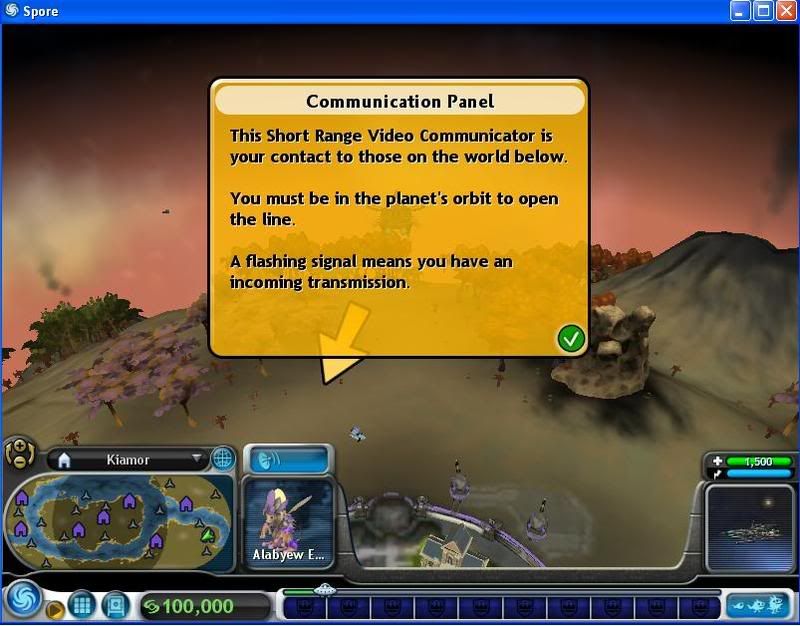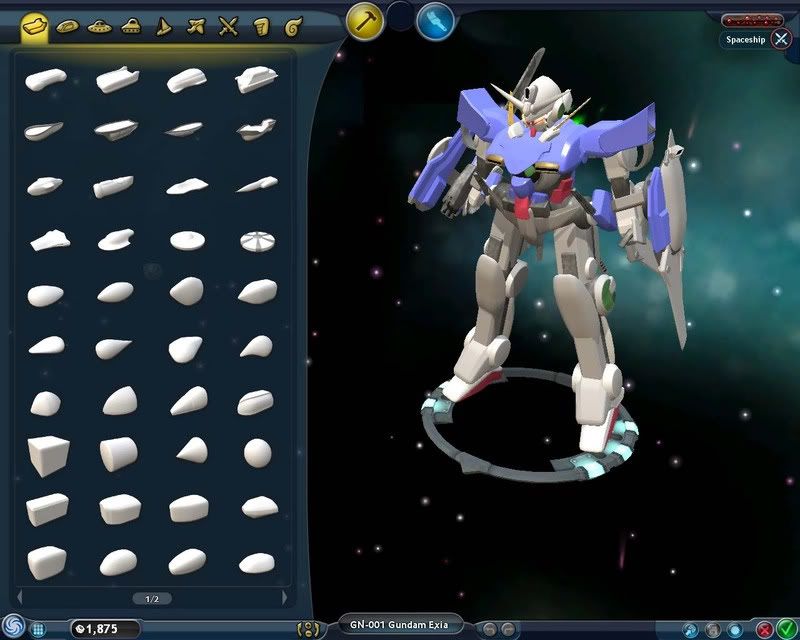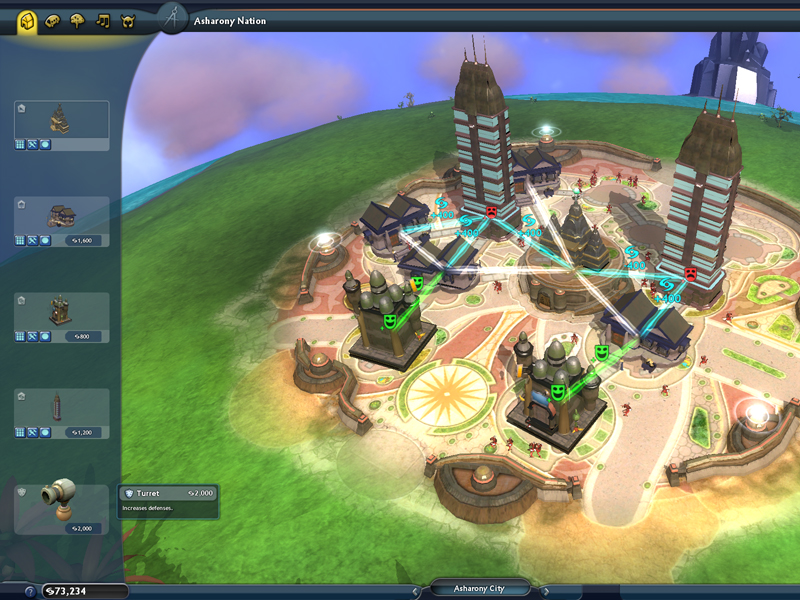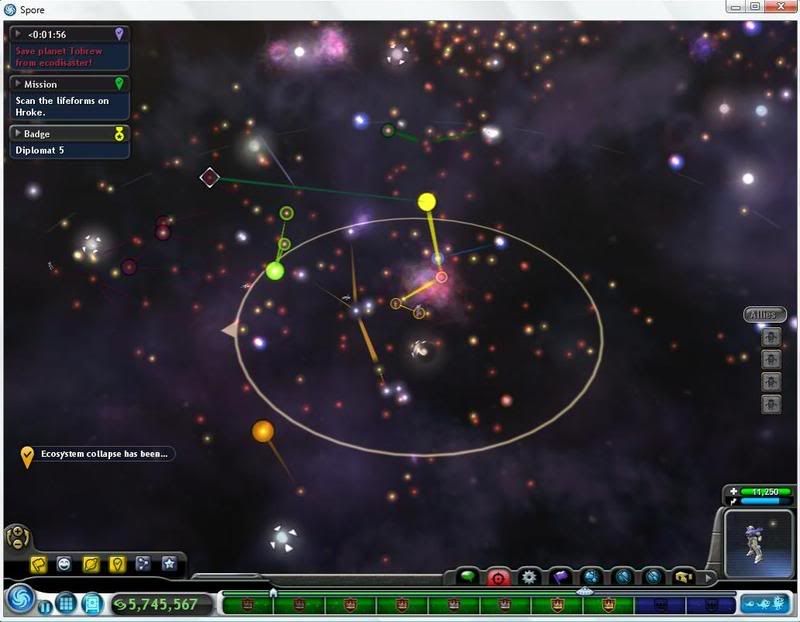a little look at spore....
Video games are a complex medium rooted in action, continuously developing at the limitation of current technologies. Due to vast components such as physical, social and mental aspects, when it comes to video games Galloway’s, ‘Gamic Action, Four Moments’, provide a stable starting point for video game analysis. These elements borrow the ideas from film analysis such as the on screen (diegetic) and off screen (non diegetic) happenings which contribute to the overall narrative. His notion of machine and operator acts are further split into diegetic and non diegetic acts, each contributing to the process of game play. Naturally, to deconstruct a video game to four distinct concepts, there is room for overlap and limitations arise. All concepts shall be further explained in relation to the video game Spore (2008).
Spore is designed to pull aspects from God game, real-time strategy (RTS) and life simulation genres to form a unique experience whereby the operator begins as a single cell organism, evolving into a complex creature conquering the various stages of evolutionary life and history.
The stages are of linear fashion beginning at cell stage, travelling to creature, tribal, civilization and the climax, space stage. The game highlights the aspect of creativity as survival depends on operator (player) acts. That is, how the operator creates their character, whether or not it has eyes, limbs, claws etc dictates it’s movements and how the rest of the game progresses.
This game begins with non diegetic operator acts. Galloway defines these actions as part of a subjective algorithm separated into set-up actions and configuration actions of great importance within game play. The opening of Spore reflects the first, as operators proceed through preference settings, choosing to be either herbivores or carnivores, game difficulty (easy, medium, hard) and naming of their creation. Although these actions seem trivial the diet choice is critical as food is required to grow and advance through the game. At such an early stage, this isn’t apparent to the operator but the choice of herbivore means that for most of the game it’s desirable and easier to befriend and ally other species whilst carnivore is to hunt. Being a carnivore is of slight advantage as you are able to eat other species you attack therefore another food source, having the possibility of faster narrative progression.
A clear example of non diegetic operator acts in Spore is expressed in the creature segments. Every time the operator chooses to evolve their creature it brings up a separate interface dedicated to manipulating, creating and testing one’s design. The degree to which one can manipulate the creatures appears endless, as the elements maybe retracted, elongated, inflated, narrowed, rotated and multiplied but at the expense of DNA points which are gathered during game play. These actions are all governed by the operator and then interpreted by the software, as seen in the ‘test mode’.
Depending on which type of addition onto the creature it dictates how it would move. Certain limbs are suited for different abilities and have their advantages in the fields of healing, speed, charge, power etc. The aim for the player would be to manipulate this in such a way that would be most beneficial to their current situation in the game.
Cheats also are of non diegetic operator acts and may be involved in this creature creator stage. The software is programmed to automatically assign features symmetrically i.e. attachments to both sides of the body. But if operators desire otherwise an asymmetric cheat is entered in after bring up the console window by the physical typing of [Ctrl] + [Shift] + C whilst the game is running. Cheats as Galloway noted are just as important to the game as other components and shouldn’t be neglected. One of the more popular cheats “moreMoney” involves adding to your game currency thus provide convenience and is helpful when buying items to add to the operator’s design.
The later non diegetic operator act involving configuration at site of play is of particular relevance during the Tribal stage which is very similar to RTS games. Here the more familiar the operator is to the keys to press the greater the chance of defeating or befriending other creatures. Taking the example of allying with other creatures, players are required to mimic their actions. This process is machine driven as one has to comply and reach their goal amongst this set of rules (i.e. the type of action and the time frame in which it must occur) but it results in operator acts.
Acts of configuration may be coupled with diegetic operator acts which involve move acts and expressive acts of varying intensities. Move acts being changing the position of the creature and camera which may be executed through the keyboard or the mouse in Spore. The field of view changes amongst the different game stages, beginning as a bird’s eye view in cell stage, to chase camera in creature stage (creature acts as an avatar, camera following behind it) and back to bird’s eye view for the following stages as there are continuously more creatures, colonies, planets the operator is required to manoeuvre and control both in diegetic (on screen) space and non diegetic (off screen) space. There is no edge scrolling until space stage, where the field of view is restricted by the instructions given to the movement of the creature. However, there are other means to explore areas of non diegetic game space; this is through the interface which is similar to a heads up display. There is a map the operator may click to look at the other areas of terrain however, cannot interact with it until the tribe or creature has migrated over to that space.
Expressive acts enable or unlock actionable objects. In the case of Spore, the unlocking of features for creatures, vehicles or buildings may be obtained by attacking or socialising with NPCs, completing missions or breaking fossils found. They range from simple operator actions such as a mouse click to complicated configuration and interaction between mouse, keyboard and feedback from the creature attacked.
On the other end of the spectrum are machine acts – actions exhibited from the game software, running the game. Many games involve cut scenes which provide insight to character development or promote narrative progression. These are considered to be diegetic machine acts. Spore, contains many cut scenes which many provide the option to the operator of being skipped. Galloway states these moments of animation are “momentarily irrelevant” where the “operator is forgotten” (pg 11). This analysis may be too harsh as despite the operator not necessarily being able to intervene, they’re still involved, watching and anticipating following machine acts. After every stage, the operator is rewarded with a short animation of the creature actively cheering and dancing along with text congratulating their achievement. Thus, promoting more game play and time invested into furthering narrative progression. The longest cut scene is of last stages of the game where one has journeyed into the center of the galaxy. Compared to all the other little achievements tackled along the way the last event is rather poor leaving gamers which the feeling of ‘that’s it?’ If Galloway’s statement were true, then this cut scene wouldn’t have evoked an emotional response from the operator. The ultimate item is claimed to be a ‘staff of life’ but in comparison to planet blasters that allow you to blow up entire planets along with the inhabitants or refrigeration rays that ice over planets destroying or improving ecosystems, it doesn’t provide a greater spectacle. The fun in Spore, arises out of experimenting with numerous tools, creature features and weapons obtained to explore the galaxy.
An important diegetic machine feature in games is the ambience act whereby the game itself is still running but the player is absent. This isn’t a relevant feature in Spore, as the game is constantly running if left on the main screen and not editor modes. Example: Civilization stage, where every minute the operator gains game currency at a set rate depending on how they placed factories or mines they are built in the town. Enemies are constantly attacking and the health of your town would decline rather quickly if left alone without the non diegetic operator act of pressing the pause button.
Missions are guided by the software but operators are given the option to accept. Much of the game is guided by tutorials that allow for the operator to become familiar with the interface before proceeding further. These instructions on pop up screens may be considered to be non diegetic machine enabling acts as they have a positive impact on game play. 
The machine provides useful details to the operator such as increasing health at each stage the creatures level up on the process bar. In tribal and space stages real time alerts pop up on the side screens, separate from the visual game world providing information about upcoming attacks or gifts received from neighbouring colonies. An essential aspect of Spore is the idea of community to advance through stages. The machine dictates the number of creatures one can have in a pack when they attack together. Once, your creature goes into war, the rest of the creatures in your pack attack accordingly without the need for further operator actions. Essentially the machine is playing the other creatures for you and is on your side. This brings up Galloway’s emphasis of cybernetics: the fusion of organic elements (the player) with non organic elements (the machine) in gamic action. The degree of connection in the relationship has direct effects on the actions involved in video games.
However, with this ideology Galloway chooses to ignore the potential of “interaction” whereby, the player may bring forth their own interpretation to the game play. By refusing to incorporate this theory it also leaves out the notion of immersion one has with their game revealing a limitation to the four axes model. The operator is more than actions inputted into a machine therefore; the operator’s intentions are to be examined for a more detailed analysis of video games (Whalen 2004). There are many paths to take as there is no one ideal goal in Spore. It may be perceived that the goal is to reach the center of the galaxy as it’s the most difficult to do, find the planet earth, collect all the times, or finish the stages as fast as one can. This game has an online element which invites and enables players to directly upload material onto Youtube and their creatures onto the Spore website. Although, this is a single-player game, there is still a large aspect of community outside of the game which in turn motivate different gamic operator actions. Players are able to download other creatures invented by others as their NPCs and involve them in their games. Due to this interaction from an online community one of the many goals not initially intended by the developers but initiated by the players is the idea of replicating already existing characters in the digital media/culture e.g. Pixar animation character Wall.E (2008), GN-001 Gundam Exia (2008) etc.



Small competitions arises as to whom can create the most accurate replication of characters and that itself is rewarding for certain groups of players.
Many aspects of games involve limited action expressed through codes and rules of the software. However, there isn’t a category in which this aspect could be appropriately placed as the last quadrant to be mentioned in Galloway’s model is disabling non diegetic machine acts related to unwanted network lag or freezes in the game etc, which are equally as irritation to the operator. During civilisation stage, the operator’s actions of where to build houses, factories and entertainment are limited to certain nodes within the town plan. They may not be placed wherever one desires. Also the software dictates how successful the operator is in the plans as the machine response to the locations of buildings of the operator with a meter ranging from sad to happy.

Space stage contains the largest area for potential gamic action but movements are constricted by ring surrounding one’s spaceship. As the player journeys closer to the center of the galaxy the circumference of movement retracts increasing difficulty of game play. Major movements are also restricted to star hopping or planet hopping. Total freedom in space isn’t allowed.
Another aspect of video game analysis which is left unattended in Galloway’s findings is the concept of playing the same game but through a different machine or platform. Spore may be experience through PC computers (which this close reading has been structured around), Nintendo DS or mobile phones. Clearly the gaming experience is altered when one proceeds form on platform to the next. As, the machine is changed the cybernetic relationship between the operator is altered and certain actions executed in previous state of the game may be non applicable.
Ultimately, Galloway’s model provides a basic deconstruction of action moments in gaming. However due to these distinct quadrants limitations arises that do not incorporate aspects of the entire gaming experience. Such limitations may be seen within the online communities in Spore, the alternate motives behind players and the variation between platforms.
REFERENCES :
Galloway, A (2006). Gaming: Essays on Algorithmic Culture. Minneapolis:University of Minnesosa Press.
Whalen, Zach, 2004. Play Along – an Approach to Videogame Music (online). (Cited 2 Novemberr 2008). Avalilable from http://www.gamestudies.org/0401/whalen.
FILMOGRAPHY:
Mobile Suit Gundam 00, created by Hajime Yatate and Yoshiyuki Tomino, 2008
Wall.E, Pixar, 2008
GAME:
SPORE, 2008, Electronic Arts


3 Comments:
diegetic - now that's a word i haven't heard in a while!
nice essay. want to do mine? :p
where can i download the exia gundam :O
This comment has been removed by the author.
Post a Comment
<< Home